Welcome to We Have to Talk, a fortnightly newsletter in which Sam and George exchange their most pressing and ridiculous reflections on pop culture. Subscribe to get a hot mess of tepid takes directly into your inbox, twice a month.
This week, the boys’ are forced to recalibrate their diva-divining instruments and report live from the scene as a former Pussycat Doll stages her coup for the Olivier.
S: Hey George, I hope you’re ready for this week’s close up! I come to you cap in hand after we witnessed Nicole Scherzinger tear the house down as Norma Desmond in ‘Sunset Boulevard’ earlier this week. I have to confess I was gleefully anticipating a Showgirls-sized camp disaster when I saw the words “Scherzinger” and “Sunset Boulevard” together on the revival’s vampy poster and strong-armed you into getting tickets. But more fool me; the production was fantastic, weaving together performance with live cinema while deploying a minimalist lighting design which wonderfully evoked classic noir. And the material is full of resonant themes; the desperation of love, the price of delusion, fame as a poisoned chalice and image-making as alienation. But at the centre was Scherzinger blowing the roof off the Savoy Theatre as the greatest tragic heroine this side of Blanche DuBois, and doing things with her voice I’ve literally never heard in my life. Her on-a-dime transitions between head voice, belts, and smokey rasp were – frankly – almost unbelievable. It’s hard to believe such a talent is probably best known in this country for judging the X-Factor.
And while I wasn’t entirely sold on some of the more humorous aspects in her characterisation, she was good enough to make me wonder – loathe as I am to take myself to the Red Table – whether some latent misogynistic streak had led me to write her off as a has-been who should stick to her strong line in dairy-based food sponsorships. Or worse, has the greatest fear of every gay man happened to me; is my diva-divining stick no longer functioning!? To be honest, I felt disappointed in myself; I had let an instinct for camp sleepwalk me adopting an ironic, dismissive, and lobotomised frame through which to consider poor Nicole. Yet I guess that’s part of the genius of the revival’s casting, as Scherzinger’s star has been reborn with a slew of awards and praise ringing out across the capital. But tell me George, what did you make of it - Sherkable or Schermazing?
G: Hi, Sam - I am pleased to report I was also Scher-zinging as we stumbled into the cold. My evening had been off to a dim start, having been shoved aside by five drunk, queue-jumping middle-aged women when I arrived - but that was happily forgotten after such a triumphant theatre experience. On my way home, as soon as the Victoria line had trebuchet-ed me onto the platform at Highbury & Islington, I hurried to Ms Scherzinger’s Wikipedia page, where I discovered she actually began in musical theatre, way before she was a Pussycat Doll. It made me think a lot about career trajectories, and how our collective expectations of a diva can often be entirely wrong - or, if not wrong, at least neglectful of the diva’s potential to diva even closer to the sun.
To clarify - Nicole was in musicals at university, and never made it to Broadway, but it certainly explained why this person I’d naively expected to have phoned-in pop-star pipes turned out to be hiding a bazooka in her voice box. And if we put her next to someone else who began in musical theatre, the randomness of it all is revealed. This comparison is fairly arbitrary, but I’m thinking of someone like Marin Ireland - someone I thought of as a dramatic actress, who delivers an unforgettable monologue in Eileen, and I’d seen in other dramatic work like The Empty Man and Girls. Turns out Ireland was a Broadway legend before she forged a career in film - nominated for a Tony the same year she played “Party Guest” in Revolutionary Road.
The two women are from entirely different backgrounds, classes and places, but it just made me think; imagine the parallel universe in which Nicole Scherzinger is at Sundance Film Festival promoting her new indie about a single mother battling addiction issues and trying to keep her family afloat, and Marin Ireland is struggling to shake off her reputation as the reason The Pussycat Dolls imploded. Does it say something about the lack of respect given to female pop stars that we don’t allow them to pivot as easily as other performers? Of course, we’re living in the timeline in which Lady Gaga is an Oscar nominee, but, I mean - she was already Lady Gaga. I remember chuckling when in the same week, Cheryl Cole was announced as the new star of 2:22: A Ghost Story, while her old classmate Andrea Riseborough received her first Oscar nomination. There are several reasons to laugh at Cheryl, but perhaps, as you say, there is some underlying misogyny there. Why can’t Cheryl be an actress?
It does make me think about how easily men can try their hand at anything without the same reputational baggage - just before the pandemic, Theo James was supposed to be in a fairly gauche-looking musical about Hollywood’s golden age, which happened to star another Girls Aloud member, Nicola Roberts. Three years on, James is an Emmy nominee for The White Lotus, and Roberts is… in Girls Aloud, again. (Which is great, but you get my point.)
I guess what we’re talking about here is scrutiny, and the culture’s unimaginative boxing-in of women - look no further than new Hunger Games lead Rachel Zegler suggesting that maybe Snow White needs a reassessment in 2023, and subsequently becoming the target of death threats from incels decrying the disease of wokeism - compared to Robert Pattinson loudly hating every last moment of Twilight and being held up as a banter king. What I’m saying is: god forbid a woman has hobbies.
S: Your zeroing-in on this being an issue for popstars especially is totally bang-on; the tittering that followed Lily Allen and Cheryl joining 2:22 being a prime example. I wonder if the spectacle of “pop” encourages spectators to understand these women as the centres of a camp circus rather than as respectable performers; there’s no Stanislavski or Actors Studio to help legitimise the deep inner-work required to practice the dark arts of pop, for example. But then you have the deranged spectacles of Gaga’s film press tours, where she gives the performance of her life in the role of “Prestige Actress,” and I have to conclude most performers end up on the side of the fence where they belong.
As an aside, the play jogged my memory of the very meta documentary Boulevard! A Hollywood Story, which exhumes a fascinating nugget of showbiz trivia. Gloria Swanson – the actress behind the original Norma Desmond – attempted to mount a second comeback off of Sunset Boulevard by adapting it for the stage long before Andrew Lloyd Webber gave it a go. The doc is possibly most interesting for its thorny treatment of a recently deceased characters’ sexuality; it is uncomfortably adamant that the deceased man was homosexual, despite his own recorded testimony to the contrary. It is a bit of a lesson in not always calling it like you see it, which I’ve now also learned not to do with former Pussycat Dolls.
Speaking of art about judging on appearance, Saltburn hits cinemas this week to the delight of the ever-growing Elordi Legion. I’ve seen it twice, the second time with a surprisingly prudish yet very vocal audience of Peckham-based Rah’s who seemed entirely on the side of the aristos and strongly opposed to anything but missionary with the lights off. It’s such a delightfully silly and sumptuous romp of a film, but with something very conservative, certainly retrograde, and possibly evil lurking under its provocative veneer. And as a statement of Emerald Fennell's anxieties about the middle classes I can only admire how much rope she handed the audience to hang her with. But tell me, have you been feeling the salt-burn this week George?
G: We contain multitudes, Sam. I’m also in both camps, in that I think Saltburn is an absolute scream – genuinely, has Rosamund Pike been better? – but I also think it’s wired with objectionable politics, and (soft spoiler alert!) concludes in a way that seems to position aristocracy as a prize - the ultimate aspirational end. That said, I’ve found some Saltburn takes dreadfully boring, concluding it as artless and devoid of any class analysis at all, which I do think is unfair. On Twitter, I saw someone decrying the depiction of the aristocratic Catton family as innocent victims, and I couldn’t help but feel like I’d seen an entirely different film; sorry, but who is siding with Pike’s Elspeth, a woman who provokes her daughter’s bulimia and laughs away the suicide of her best friend?
Zooming out, you’ll have to forgive my laziness, but I almost can’t be bothered interrogating Saltburn’s moral core too closely - at least it’s getting bums on seats, is funny, and has a great cast (my distaste of El*rdi put to one side for now). But I also think people’s wider irritations with the authorship of this story are very valid, in that people like Fennell, a jewelry heiress and schoolmate of Kate Middleton, have a much easier ticket to success than working-class - or even middle-class - aspiring filmmakers. The ever-widening inequality in this country gives little hope for that to change in the immediate, but at least we’re seeing films like Scrapper and Rye Lane performing decently at the domestic box office - showing that people at least have an appetite for stories that aren’t just about people who live in houses with names.
That is to say: I remain a Saltburn stan, even as Emerald Fennell sinks further into the hole she keeps digging, as she shirks questions about her undeniable poshness. I’m just happy for Alison Oliver, who it seems has been able to turn her career around from the failure of Conversations With Friends in the short space of a year, and, in my opinion, is the standout performance in Saltburn as the prickly, volatile and vulnerable Venetia (See also: Venetia! You can’t deny Fennell is good at writing what she knows).
S: I don’t think I’ve ever seen the name “Elspeth” written down before, and I can’t lie, I’m struggling with it. And alas, with that (and Substack’s length limit) the curtain falls on another edition of ‘We Have To Talk’. And so, much like Norma Desmond, we withdraw, safe in the knowledge that we once again dazzled our starry-eyed audience who anxiously await our next return to the limelight. Until next time, you wonderful people out there in the dark!
From the Drafts:
Big week for homosexuals in tech: Tim Cook got an inside look at Casa Lipa, while everyone’s favourite possible-apocalypse-architect-cum-doomsday-prepper, Sam Altman shocked the world by executing a tried-and-true messy manoeuvre in record time; after breaking up with his former beau (Open AI), he quickly shacked up with a new, deeper-pocketed hunk (Microsoft) which immediately made his ex take him back, all within 48 hours. That kind of enviable efficiency is why I could never make the C-suite. (S)
After May December, Julianne Moore continues to out-slay herself: she says “cockstruck” in the trailer for Mary & George and orders her son to sleep with a King for political gain. I’m seated. (G) That’s my cue to plug the under-discussed Savage Grace in which Moore tries to fuck the gay out of her young son, Eddie Redmayne. (S)
Tate McRae? More like Ate McSlay! But how did Britney Spears end up on the moodboard of the chanteuse behind this pandemic-defining sad-girl ballad? (S)
Reese Witherspoon going to space before Liv Tyler seems unjust. (G)
Nothing to see here, just Jacob Rees-Mogg (basically) calling Rishi Sunak a f*ggot in The Telegraph. (G)
Favourite profile detail of the week, by way of British GQ: Andrew Scott getting rehydration IV drips, but admitting, dejectedly: “I’m not sure they [work].” (G)
Speaking of unexpected celebrity shills for Big Dairy: here’s an absolute fever dream in which Aubrey Plaza implies oat milk drinkers are delusional weaklings. (G)
The Week that Was:
George is watching: A Murder at the End of the World, the new series from The OA’s Brit Marling and Zal Batmanglij. Sad to report Emma Corrin is quite wooden in the lead role, but the central mystery is compelling, and the Icelandic setting offers some pretty pictures.
Sam is reading: ‘The Vegetarian’ by Han Kang which pulled me in with what is possibly the nastiest opening page of a book I’ve ever read in my life, but which is slowly unfurling itself to reveal something much more rueful and sad.
George is listening to: During a recent bout of insomnia, I listened to an episode of BBC’s In Our Time all about Jupiter and its fucked-up moons. Fascinating, but I have one note - no disrespect to a broadcasting legend, but I feel Melvyn Bragg should be reminded to turn his microphone off if he’s going to mouth-breathe while listening to his guests.
Sam went and saw: Boy Parts at the Soho Theatre. An admiral staging, but beat-for-beat this is an ‘American Psycho’ reskin for Goldsmiths grads.




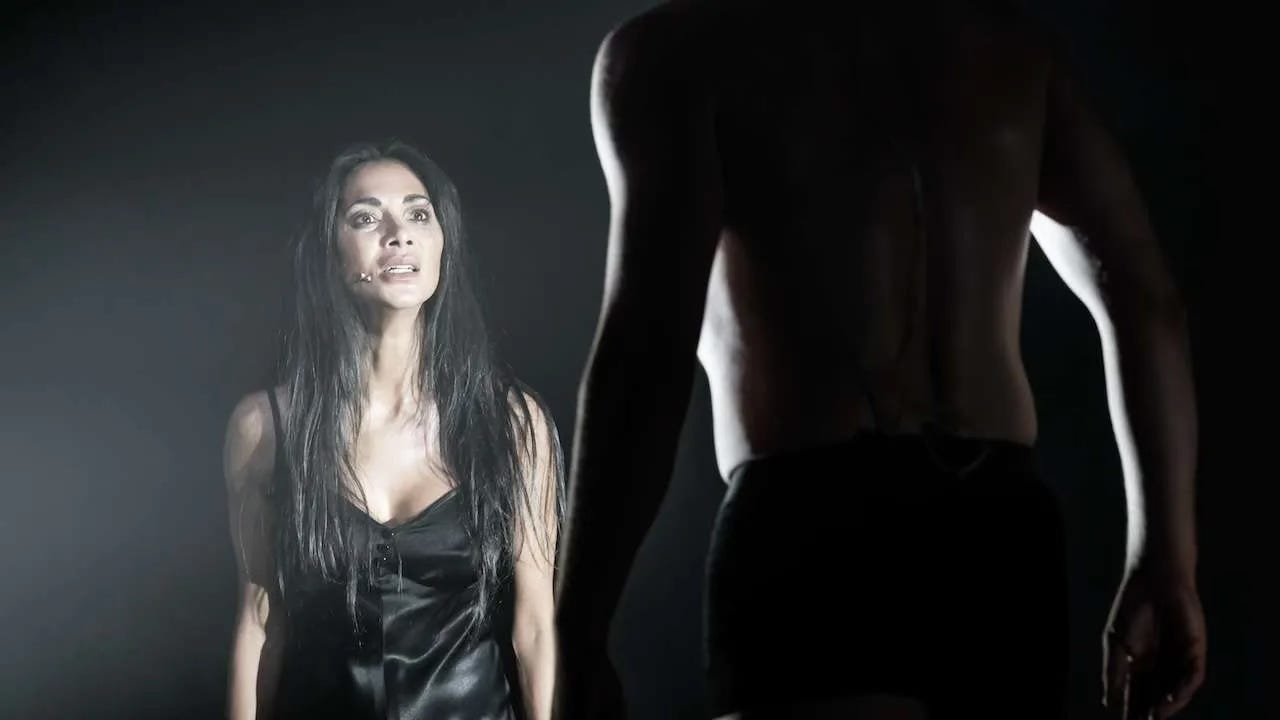
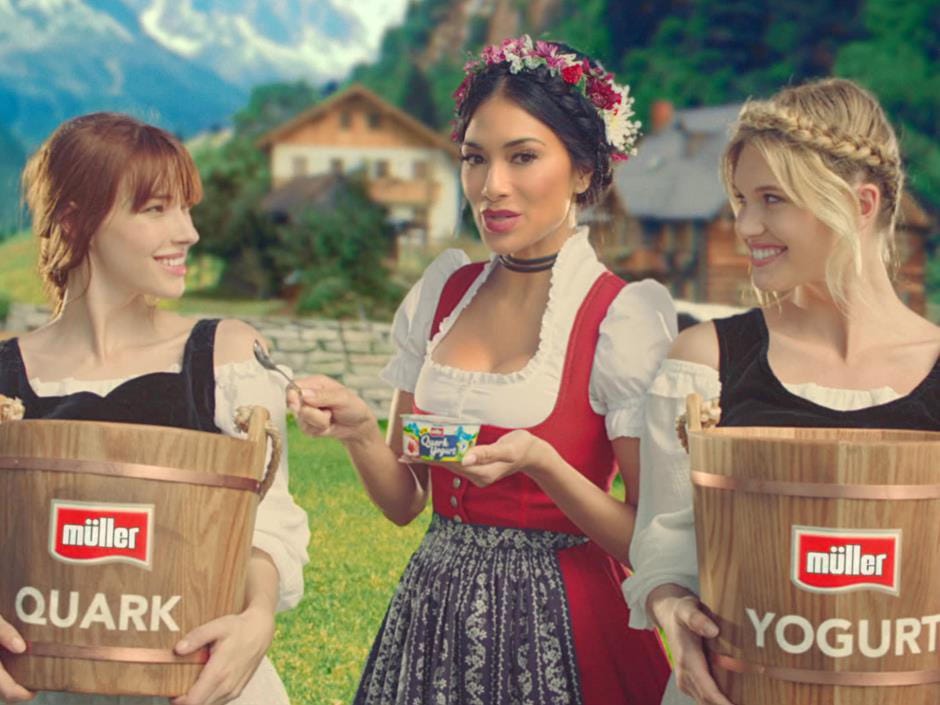
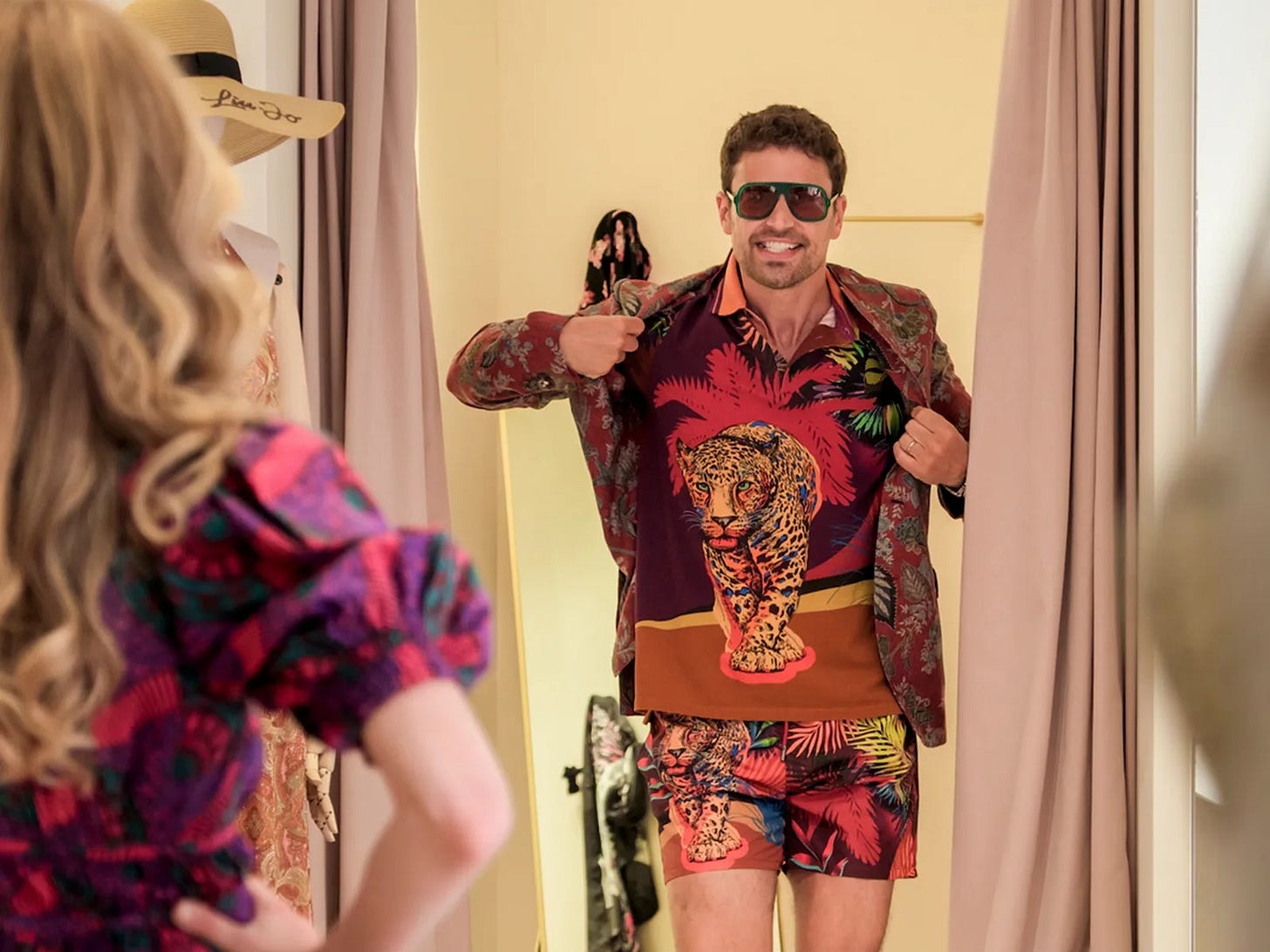
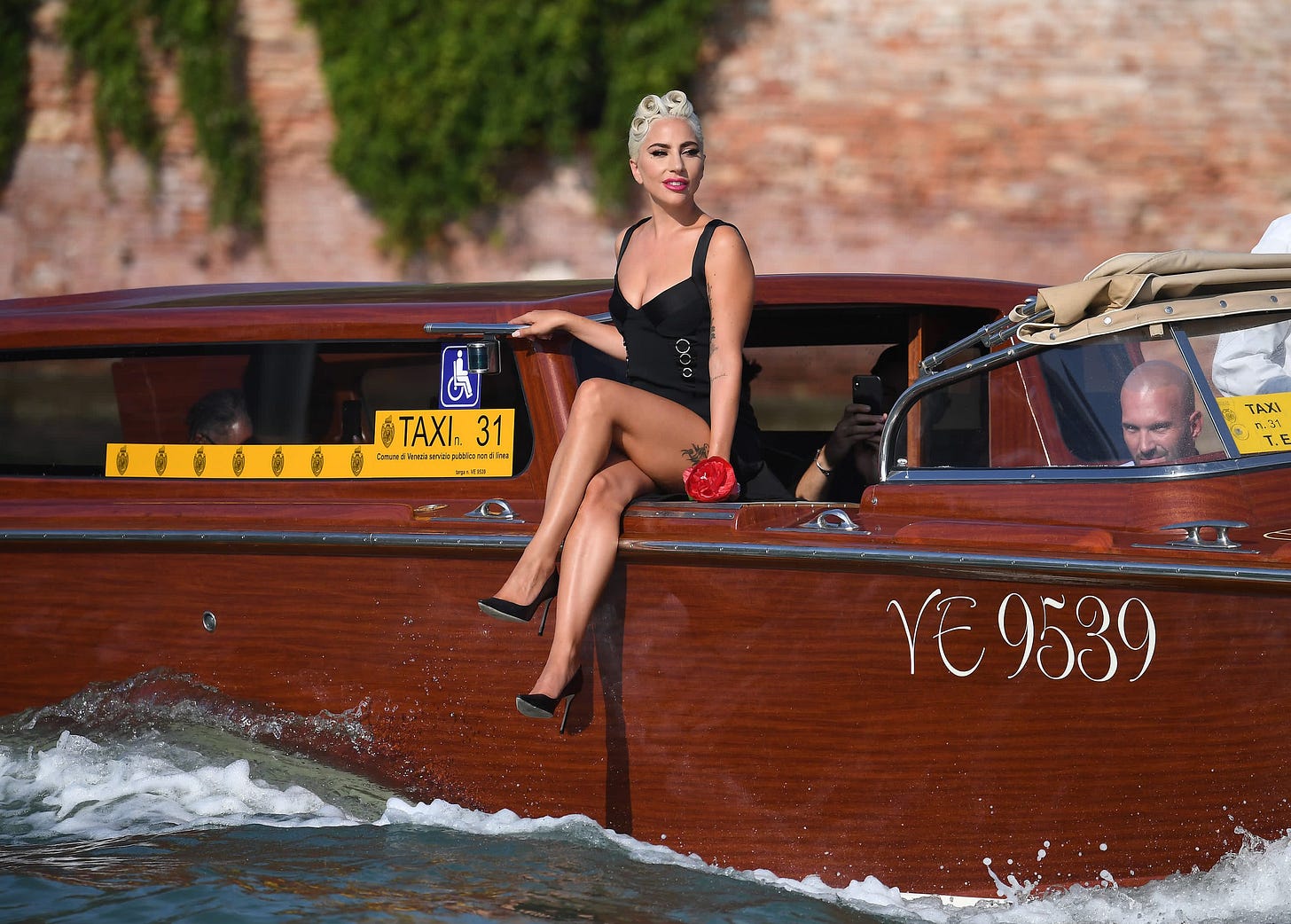
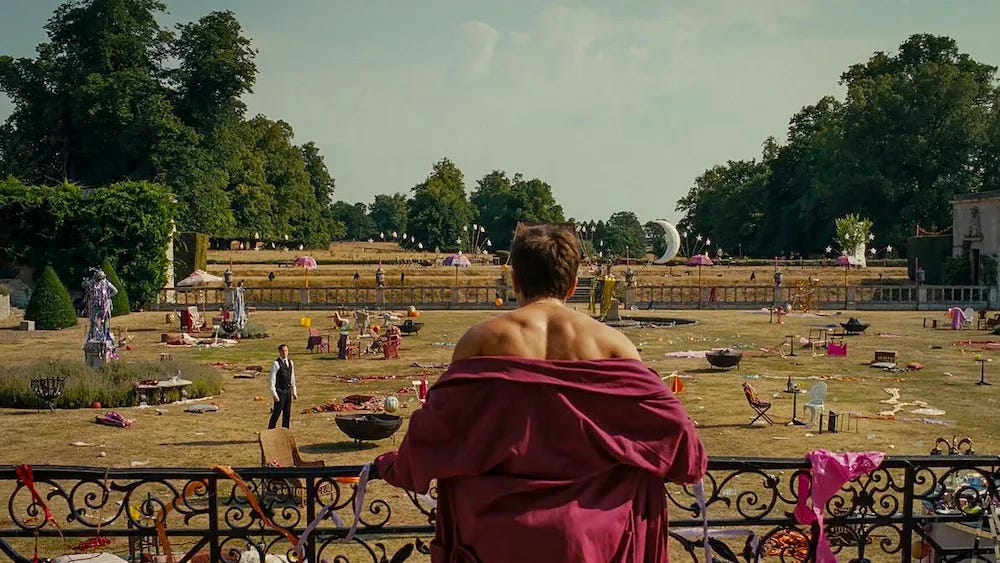
ObSESSED with this weeks newsletter ! I’ve been giggling all morning